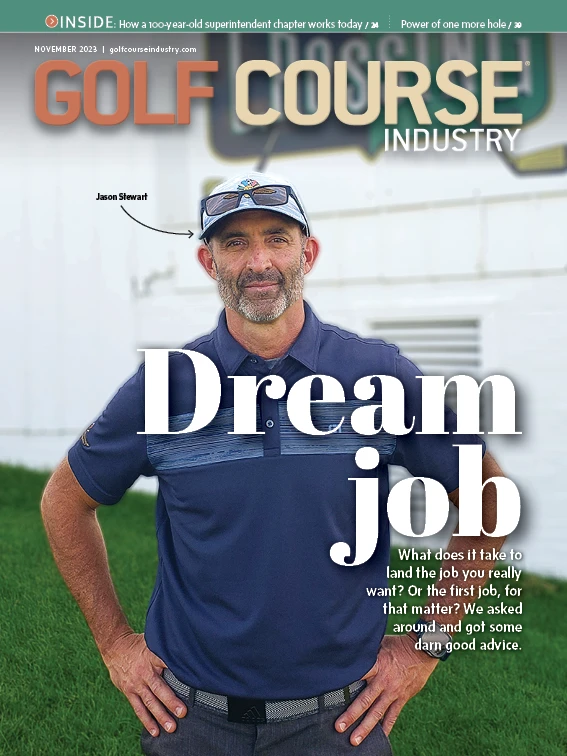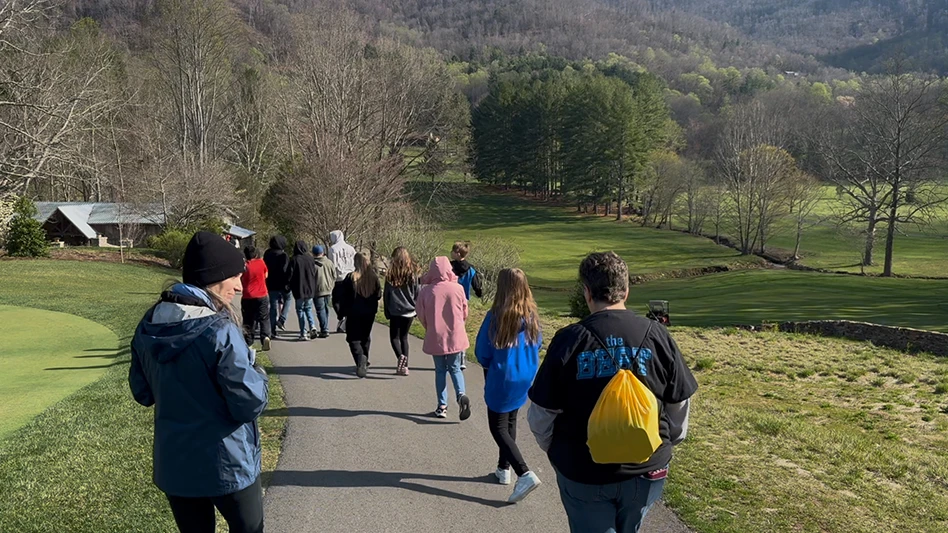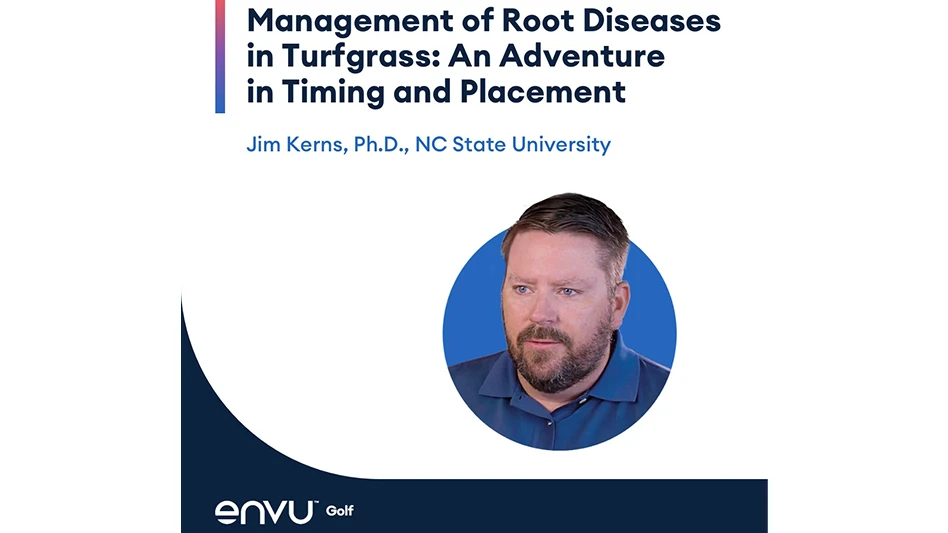
There are no hard and fast rules that apply to every job application. Every posting will receive loads of qualified applicants — and plenty of unqualified applicants, too — and a handful will rise to the top. But crafty cover letters and packed résumés don’t always translate to interview success. And good luck trying to translate what every board member really wants.
What does it take to land that top job? We hit the road, picked up the phone, and — yes, even in 2023 — turned to social media for the kind of advice, experience, and life stories you wish you had when you were starting out. (And if you are just starting out? What perfect timing!) You might want to save this issue for future reference.

Jason Stewart
Indianapolis Motor Speedway, golf course superintendent
Nothing has ever gone the way I’ve planned it. I never planned to stay here for all these years. I didn’t know I would marry the person I knew when I was a little kid. We went to school together, we went to college together. She was the best wingman I ever had. And we did not plan for twins.
I’m a golf course guy. I went to school to be a golf course superintendent. I did an internship here and never planned on staying, but I am from Indianapolis, and I love the place, so it just kind of worked out. And my wife, Denise, had no intention of leaving.
After Roger Penske bought the Speedway, he told me, ‘You’re going to take over all of this. This is what I want, and I want you to do it. You’re going to do it and you’re going to be great.’
It’s almost like I just stayed here and kept working. That’s a really shitty way of explaining it. There was a lot of hard work. But that’s not typical for somebody trying to find a destination job. I started at the very bottom and I just kept going up and outlasted everybody.
Know exactly what your strengths are. Knowing who you are and what you have to deliver, that takes some really honest thought and conversation with people who know you. That’s important. Because then you know what you can do and you can offer that up.
Out of school, I wasn’t doing to the level what guys are doing now. I was suit and tie, had my résumé tidy, but that was about it. Now they have their own personal websites, portfolios. You have to one-up all the time.
Perception, how you look and dress, your professionalism, that’s what gets you a higher salary and bumps you up into the next level. Everybody knows people who do a hell of a job on the golf course, but you can’t show up in the wrong clothes to meet with a group of people who see things through a different lens. They don’t want to give you their money or time if you can’t figure that part out.
You have to be relational and you have to be somewhat charismatic. And you can work on that.
It can be a lot easier to just dig a hole.
Your whole life, you’re told what to do. You never have the autonomy to make decisions. But every time you take one step, it gives you the confidence to start making decisions. You have to go on those job interviews to see what they’re like. We have these mock interviews with our interns. I bring in HR and another department head, and we sit down. It’s a formal setting and these kids are a wreck. They’re still in school, they’ve never had a setting like that. And even our best performers, they’re stepping all over their words. You know they’ve rehearsed these things and they just can’t get them out. But that’s where they get better.
Go do it. Make a mess of it. Force yourself to go in there and do the best job you can. Prepare for it, but be OK with messing up, because you’re learning. You either win or you learn.
By your 10th time, you should be pretty damn good at it.
You may or may not get what you want. You have to be patient, and you have to keep going after it.
No matter how much it pays, if you’re miserable, it’s not worth it.
Denise was a coach for teachers and she would tell me to celebrate my accomplishments instead of lingering on my failures. ‘Don’t see the dead grass.’ That was extremely helpful.
I tell her, ‘I’m not doing this shit anymore. I’m done. Done. I don’t care. I’ll do something else.’ And she says, ‘You know it’s the last week of August, right? You quit every year.’
Nothing will ever happen on your time.
Numbers to know
What’s more important when you are hiring assistants?


Chad Mark
Muirfield Village Golf Club, director of grounds operation
Every day is an audition. You can’t fake it and then all of a sudden put together this great interview.
I remember when I interviewed at Kirtland (Country Club). I got that job a long time ago, in 2003, and I didn’t do anything fancy. I hand-delivered my résumé because I was nearby and met the GM for a few minutes.
My philosophy has always been it’s their interview to give. I didn’t ask to give a presentation. I didn’t try to take over their time. You have to remember to let them dictate where it goes. Some clubs are going to be wowed and a guy will get a job because of it. Other clubs might not hire a guy because they didn’t stay within the lines of the interview.
They might have a list of 15 questions they wanted to ask you and only get to three of them because you took over the interview, and it may or may not hurt you.
I didn’t really interview for this job. Quite frankly, I was surprised when everything happened. I worked for a great general manager who helped grow me in this business, Richard LaRocca. I was very close with Richard. When Paul B. (Latshaw) left here, I was solely focused on Inverness Club. Didn’t even cross my mind when I heard Paul left. Richard called and said, ‘Call my nephew.’ I said, ‘Richard, I can’t leave here now.’ ‘You need to call my nephew.’ His nephew is Nicholas LaRocca, who’s our general manager. I guess Nicholas had seen enough through the years to know he thought I would be successful here and he wanted to bring me here. It just emphasized to me that if you do it right every day, people do notice.
Boards and committees often don’t understand what we do. There are always going to be some turf questions in an interview for a superintendent position, but our guys are asked more business and staffing and communications questions. Boards know that if they get the right set of candidates, most of those guys can do the turf part. But can they manage probably the biggest budget at the club? Can they hire people in a really tough labor market? Can they retain those people? Can they communicate to their people, the board, committees, and the entire membership? Can they be a team player and work well with others? I think that’s what’s gotten a lot of our guys opportunities. We’ve worked on those things here on a daily basis.
For everyone who has left, there have also been guys who have interviewed and not gotten the job. We look at that like we look at everything here: What can we do better next time? We take a hard look at every person’s interview process and see where it went wrong. If we’re lucky, we can get some feedback from the club and see what somebody else did better than them, and then work on correcting that and making them better the next time they interview.
We go pretty hard to recruit our interns and to get them to have a great experience that will help them with their career. I’m going to Penn State next week. We go on the road quite a bit. There were a lot more students when I was in school. We would go on the websites, find what jobs were available and apply. Now, we go recruit them. That’s different.
Some of them we want to have back as full-time employees. They’ll work their way up the system, get to the assistant level, then move on and get their own gig.
I’ve been very fortunate. Throughout my career, I’ve never had to hire an assistant from outside my organization. I’m a big believer that my toughest recruiting right now is to get those young, hungry graduates out of school through the system. I have several assistants right now. I know who the next superintendent here is.
We lost our last assistant last April. It was a great position for him to elevate himself, and I’m not going to keep a guy back from something like that. That’s why they work so hard.
If I was encouraging a young guy to get into this, I would say either major in or minor in business.
I minored in agricultural business. I think that helps me. I took almost as many business classes as I did turf classes. We took everything from accounting, to leadership, to management, to statistics.
I have a son who’s 19 years old. He’s in college and he’s thinking about going into this, and I think it’s great.
As superintendents make more money, clubs are going to expect more from the business side.
The successful superintendents I see run it like a business.

Tony Kowalski
Pete Dye Golf Club, general manager, previous golf course superintendent
Jason Hollen
Pete Dye Golf Club, golf course superintendent
TONY: I got here opening day of 2019. Jumped right in as superintendent.
They didn’t even advertise for the job, like a lot of good jobs in this industry. So just staying in contact and networking, that’s the message I would send to all the young kids in turf school. Meet as many people as you can, go to conferences, talk with people. I’m a perfect example of that paying off.
It was the end of August ’21 when I officially got promoted to GM. I was kind of doing the job for a month or two before that. We had a hire not work out and the owner was racking his brain for what to do and I decided to perk up and say, ‘What about me?’ Some days, I’ve lived to regret that, but most days it’s been solid — particularly once I realized (Jason) was moving back to the area and it was a perfect fit.
JASON: I was in Florida. Tony gave me a call and told me about his news. I had planned to call him probably 30 days later because I was going to come home and mow fairways for him. That got the ball rolling.
TONY: I went the more traditional route to find somebody. We posted it, and with everything that was going on — he was trying to manage his current job down there and figure out how to move home — you never did see the ad we had out, did you?
JASON: No. I had no idea.
TONY: We kind of had our minds set with where we were at the time maybe there was someone younger looking to cut their teeth. I didn’t think we were going to be able to find somebody with the experience that he could bring to the table.
JASON: Serendipity.
My entry to the golf industry started with a connection through my mom. She knew somebody who knew the designer of the course at Snowshoe. That’s where I started. For introverted people, it’s talking and telling people what you want to do. You never know when you hit the right person.
I was in the design and construction side of it, and when we made a decision 14 or 15 years ago to return to West Virginia, I was not going to go on the road, so I went to the maintenance side. So I approached it differently than I would have out of turf school. ‘I have this experience. Can that get me in as an assistant?’ There were a couple places that decided that was OK. It is who you know. I’ve been fortunate enough that’s what worked out.
TONY: I interviewed at a couple places at various levels. Got a phone interview, an on-site interview, had successes and failures in that, and then this worked out.
The failures gave me a comfort level for this position. I remember the first interview I got, I never got past the phone interview and I realized how stiff the competition was. I got a chance at Wilmington (Country Club) to be a part of a lot of things but having direct interaction with the people who actually run the club and membership was always a little bit above my pay grade. That was one of my weaknesses.
What does it take to get in front of the people who are actually going to make the decision? Each situation is different. Depends on what club you’re applying to.
You walk in and there are 14 people and they’re all looking at you. ‘Oh. Time to know what I’m talking about.’
JASON: I’m introverted but I’ve worked through it for many years to be extroverted.
TONY: Guys who are successful have to.
JASON: Speaking in front of a group of people every morning for the past 15 years? I have to be.
TONY: We’ve been fortunate to harness local talent and local potential. Out of four assistants, how many have turf degrees?
JASON: There are two degrees, but they’re not really turf degrees.
TONY: We’re in the business of delivering chances.
JASON: When I started at Stonewall, I looked locally at what I had. Somebody gave me a chance with a nontraditional route and I started to do that for others. All of our assistants’ experience is golf course experience. It’s not from a school. They’re well-suited for right here, right now.
TONY: All four of them, they maybe don’t have the piece of paper to back up their career choice just yet, but they have that intangible hunger to succeed and learn and grow. When you’re sifting through a pile of résumés, that’s kind of what you’re looking for — or at least that’s what I’ve been looking for. Because I can train the right attitude, but I can’t train the right attitude into somebody. I’ve worked with a lot of people who look very good on paper, but they’re not worth a shit in the field.
JASON: That’s very true. Very true.
TONY: A degree gets your foot in the door, just like knowing the right person when the job comes up is going to put your name on the list. It gets you a chance, and it’s an advantage. But at the end of the day, you have to show up and do it.
JASON: In each of the four assistants, there is a spark. They want to do better. They want to work to be appreciated. There are different levels of motivation in each of them, and it’s nice to be able to count on it.
TONY: Most people are interested in going to the flashy places that are going to fast-track their career. I get it. I did the same thing. I do not blame them. Keeping our focus on finding the right people in the area and showing them what we do, right now, seems to be more of an effective approach.
JASON: I think a lot of our success right now does lie in being able to cultivate local talent — and it can come from strange places.

Tyler Bloom
Tyler Bloom Consulting, founder and search expert; former golf course superintendent
Do you have a clear vision of what the next step is? Is it really, authentically clear what that job is? How much does it pay? Where is it located? What kind of resources do they have in place? What kind of culture would you be best suited to thrive in? It doesn’t always have to be a top-100 club or a club that’s hosting the U.S. Open, but what really is your dream job? And can you succinctly communicate what that is? Are you self-aware of your own strengths, weaknesses, behaviors? Of your reputation? Because that reputation is going to follow you. It’s going to leak out. Clubs are putting more emphasis on thorough vetting of their executive leadership team — industry references, back-door references, member references, legal history. Candidates have to get out on paper who they are and what they represent.
You can find anything on the internet. Public records, felonies, misdemeanors.
I try to give really direct feedback, because they need to hear it. If not, they’ll just kind of keep going through the same motions and making up some story about why they didn’t get the job. I think it’s just better to be direct with people.
Make sure your résumé and portfolio are up to date and polished — if you have a portfolio. I’m surprised how many people don’t. That’s been very disappointing, that people don’t take their careers seriously enough to document their successes.
You have to do your homework on yourself. What have you achieved? If you’re not confident about why you’re great, it shows in an interview.
A candidate recently brought his drone for some aerial photos of the course prior to his presentation. That was pretty outside the box. And then he put together a spiral-bound presentation for every committee member, named every committee member, gave them their own custom report. That’s the level that should be expected. That was great.
There are variables outside your control.
Sometimes the personality just doesn’t match. No matter how good they could be on paper, there could just be an awkwardness — anything — that doesn’t fit the club. Some candidates I think are a home-run hire and the club doesn’t want anything to do with them, and it’s just the personality.
It’s a very humble community, almost to a fault. It can hurt people in interviews. You don’t need to be braggadocious, but you need to be able to say, ‘Here are my accomplishments in my current role. Here are the obstacles we’ve overcome.’ Some great candidates get in the room and totally undersell themselves.
Most candidates are very professional, very cordial. They don’t want to talk poorly about somebody else’s property, and they’re sometimes almost too nice. Every committee wants their golf course to be better. You have to find flaws to the smallest degree, and you need to exploit that and tell them what you will do better. If you go into an interview and say, ‘Everything’s great here,’ you’re not getting the job.
We all deal with complacency. You drive by things that used to piss you off and get you fired up, and now you let them go. That trickles down to the staff.
You have to keep reinventing yourself — in leadership, environmental stewardship, technology, member relations, golf IQ. And it’s tough. People want to have lives. You put in all this hard work and at some point you want to reap the rewards, but it’s a grind.
Five years at a place, you’ve probably gotten pretty accustomed to the growing environments, what works, what doesn’t work, maybe you’ve done some projects, and there’s no long-range improvement plan. And if your facility isn’t improving, maybe that’s when you need to start looking for something better for you.
Superintendents need to be able to communicate and say when they’re getting stretched in too many different areas.
I had a club president tell me, ‘I don’t give a shit if we get a guy that’s got three years of superintendent experience or 15. If that guy comes here and does an awesome job, we want other clubs to recruit our guy. It’s our problem to pay that guy what he’s worth. I’m done with getting incrementally better. I want the guy other clubs come and steal from us.’

Explore the November 2023 Issue
Check out more from this issue and find your next story to read.
Latest from Golf Course Industry
- The Aquatrols Company hires marketing manager
- Renovating Bredemus in West Texas
- Renovation starts at Okatie Creek GC at Sun City Hilton Head
- The Fittest Podcast in Turf: Episode 1
- New 6-hole course debuts in Oklahoma
- GCSAA announces Grassroots Ambassador Leadership Award recipients
- Reel Turf Techs: David Gummo
- PBI-Gordon promotes two to executive level





